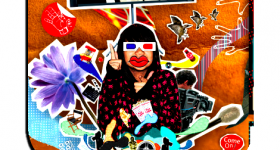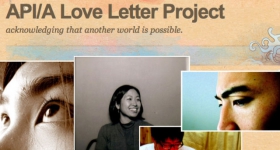Earlier this week, an entry on online community art project Post Secret caught my attention. Entries are comprised of anonymous secrets mailed in via postcard and this particular piece featured a young Asian American woman smiling as two white males held her in the air. The secret read: "Coming to college has made me extremely aware of my race."
Whether this has been an emboldening or detrimental awareness to the writer, we'll never know beyond our own speculation. But the sentiment is familiar. For many of us -- particularly those of us from areas not as populous with people who look like us -- college is when our racial and ethnic identities begin to form. You step onto campus, extend your arms wide and deliver the clarion call: "My peeeeeeeps!"
Or perhaps, it's a tad more subtle.
For some, it begins in that Asian American, ethnic studies, or sociology class after a steady educational diet of Eurocentric history from K-12. For others, it's at that first awkward Asian American student group meeting mixer in some basement room of a student union with greasy (but free!) pizza slices. I remember my first Asian American mixer, freshman year. It involved a relay race. My attendance at meetings fell precipitously after that.
Many speak of their Asian American or racial/ethnic/sexual/political awakening from being at college. But often that politicization is a response to something all too familiar: good ol' fashioned racism.
Sometimes it's racist comments made face-to-face. Sometimes it's expressed in a school's newspaper. In my undergrad experience, racism on campus went online with Xanga (I know, I'm old) and Facebook groups started by white students who targeted Asian and Asian American students at our university. I believe one group was called "For People Who Hate All Ching-Chongy People on Campus." Or was it "Ching-Chang-Chongy?" No matter. After I reported them to Facebook, they changed their name to "OSU White People." Clever.
If there is a positive outcome of experiencing racism as a college student, it's that it provides a catalyst for organizing and uniting with anti-racist peers from a diverse (hopefully?) group of communities across campus. Sometimes it adds that level of consciousness to the "I'm Asian American. YEAH!" sentiment that often comes with simply being part of a larger, more diverse environment.
And that consciousness is becoming more and more necessary these days it seems. Just a cursory search on Angry Asian Man yields recent story results of suspected or documented hate crimes against Asian American students from California to Texas to Indiana to Alabama.
Last year's "Compton Cookout" controversy at UC San Diego sparked protests and outrage from the campus's African American students who felt unsafe and that their voices were unheard by administration.
And a week and a half ago, Gawker pulled together a list of racism-related incidents on college campuses across the country that had occurred within days of each other.
What seemed so troubling to me after reading Gawker commenter reactions to this post was the sheer amount of reductionism going on: Schools in the South are bound to be racist. Schools in the Midwest are bound to be racist. Frat guys are bound to be racist. Frat guys aren't racist, they're just dumb. College racism is actually just stupidity and immaturity. And of course, racism happens on every campus, every day, all day. Why is this news? Even those that criticize the incidents chalk it up as an almost natural occurrence. Which made me wonder: have any of these anonymous commenters ever been the target of racism? I'm thinking maybe not.
Apparently, being subjected to racism is simply a part of the college experience, just like beer drinking, textbooks more expensive than street drugs, and abdominal weight gain. If that is the case, I do wish they would print that factoid in the brochures or perhaps have a PowerPoint slide dedicated to "How to Prepare for Racism" during Orientation.
I'm not naive enough to be shocked by this notion of ever-present campus racism. I'm just a bit disturbed by how resigned the majority of the commenters were to it, how they were "over" news stories on racism. Racism is so ubiquitous you might as well not report on it. How's that for post-racial?
However, one astute commenter, who appears to be African American from her profile picture, made this point: "it's important to keep in mind that from the perspective of the people on the receiving end of this kind of racism it makes not a damn bit of difference what the motivation is."
Ah, there it is. The perspective of someone who doesn't have the privilege of ignoring race or racism.
We never quite hear enough from the students who belong to the racial/ethnic groups being targeted on campuses, at least from mainstream sources. We may hear a pat answer from administration on how they are handling the situation. We often hear justifications on behalf of those responsible. They're just joking! They're just kids being kids! They never meant to offend!
Though their voices may be neglected from university administered press releases or major media outlets, we know students are working on the ground level in response to racism at their colleges and universities. Just like the Post Secret writer couldn't help her heightened racial awareness, students facing racism on campuses nationwide can't help but have some reaction to these incidents, reported or otherwise. Thinking of something as "old hat" is a luxury, one that doesn't exist for everyone.










Comments
Hi RY,
Thanks for the kind words! I think the midwestern Asian American experience is very much a unique one and sometimes it takes a bit longer for political consciousness to develop when you're so outnumbered demographically. For me, it took moving from Ohio to California for that to really happen (I attended a handful of Asian student org meetings over four years, at best). I have no doubt that there are young Asian Americans are being active and vocal at OSU now and their voices are so necessary, particularly since we focus on California and New York as regions of "real" Asian American experience and tend to ignore lesser known areas. That, to me, is a huge mistake.
P.S. It's funny you bring up The Lantern, because I distinctly recall that the OSU Asian American Association took on a racist restaurant reviewer that was on staff there in the early 2000s. Some things never change, apparently.
Best of luck to you,
Sylvie